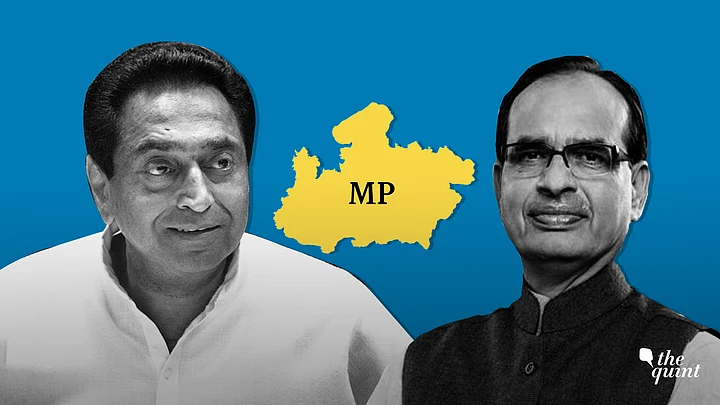Massive turnout is a sign of change. The same happened in Malwa region during the Assembly elections and the BJP received a major blow there. SC’s order on Forest Rights Act and State government’s decision to add Gondi language (tribal language) in primary school books tilted the tribal voters toward Congress, said senior journalist Rasheed Kidwai.
The six tribal-dominated parliamentary constituencies of Madhya Pradesh have recorded a massive surge of nearly 9 percentage points in turnout, compared to 2014 General Election.
This is the highest increase in voter turnout in this Lok Sabha election anywhere in the country — Round 1 in Andhra Pradesh saw a jump of 8.78%. Elsewhere in the country, there has not been a significant rise in turnout. If anything, it has dipped in a few places.
Six seats of Madhya Pradesh including two reserved – Sidhi, Shahdol (ST), Mandla (ST), Balaghat, Jabalpur and Chhindwara – had voted in the fourth phase on 29 April 2019.
Despite the searing heat — temperatures ranged from 43 degrees to 44.5 degrees Celsius in these parts — the average turnout was 73.8%, a leap over the 64.8% seen in 2014 polls.
The massive turnout set the tone for the remaining 23 seats, including eight reserved seats, and people in the state are in a mood to usher in change, says senior journalist Rasheed Kidwai.
Similarly, during 2018 Assembly elections, massive turnout was reported in the Malwa region, a BJP bastion, after numerous farmers’ protests – and the BJP suffered a major blow there.
Why BJP Might Lose
When asked about reason for this massive turnout in a tribal-dominated region, Rasheed Kidwai said that tribal and SC voters are annoyed with the BJP over its stand on the Forest Rights Act 2009, for his pro-business image, and incidents of Dalit atrocities over the last five years.
“Massive turnout always a sign of change and high voting percentage suggests tribal voters want to usher in a change in the region. So, they have voted in large numbers,” said Kidwai.
The BJP has dominated this tribal region for the last three decades. In the 2014 general election, six out of five seats were bagged by the BJP while the Congress only managed to win one – Chhindwara. In recently concluded Assembly elections, however, the Congress got 21 of the 38 seats in Mahakoshal region, while the BJP won 17.
“The tribal votes have been slipping from BJP and tilting towards Congress. The reasons are numerous. The Congress may win three-four seats out of six,” said Gondwana Gantantra Party (GGP) leader Gulzar Sing Markam, an exclusive party of tribals that is active in the region.
Referring to the Supreme Court’s recent order on the Forest Righs Act, Markam said, “The BJP is a pro-businessmen and anti-tribal party, which wants to hand over forests to businessmen – the recent SC order proves it.”
Gond and Baiga tribes dominate the region. For the last two decades, the Gond tribe has been demanding the inclusion of Gondi language in primary schools, hence, soon after coming to power, the Madhya Pradesh chief minister announced the inclusion of Gondi language in primary schools.
9% Surge in Polling Percentage
In all the above seats, tribal voters are key. Out of six, Mandla and Shahdol are reserved seats and rest of the four seats are dominated by tribal voters.
There are 1.05 crore voters in all six constituencies, according to the Election Commission of India, of which 51.1 lakh are women and 53.9 lakh are me. If we talk about the tribal voters, nearly 60 to 65 % are tribals.
Chhindwara, where CM Kamal Nath and his son Nakul were in the fray for the Assembly and Lok Sabha seats, have 15.12 lakh voters, of which 72% are tribal and SC. The seat saw the highest turnout of 80.5%.
Shahdol has 16.55 lakh voters and recorded the highest jump of 13% in polling – from 62% in 2014 to 75% this year. Shahdol is a reserved seat with 80% tribal and SC voters. BJP’s Himadri Singh and Congress’ Pramila Sing were in the fray here.
Jabalpur, where Congress stalwart Vivek Tankha and BJP’s state president Rakesh Singh were contesting, has 18.18 lakh voters and recorded a nearly 11% increase, from 58.5% in 2014 to 69.4% this time. The seat has a whopping 45% tribal and SC voters.
In Mandla, which is already a reserved seat, there are 19.49 lakh voters, with BJP’s candidate and former Union Minister Fagan Sing Kulaste, and Congress’ Kamal Maravi competing. The seat has 55% tribal and SC voters and has recorded a 10% surge in turnout this year.
Sidhi has 18.43 lakh voters with 65% tribal and SC voters, and has recorded a jump of 7.3% from the 2014 election. Congress stalwart Arujn Singh’s son Ajay Singh and BJP’s Riti Pathak were competing here.
More than 55% of the voters in Balaghat are tribals and SC. There are 17.65 lakh voters in this seat and this time, the Election Commission has recorded an 8.8% jump in voting percentage, pegging turnout at 79.6%.
Polling was peaceful in all the above seats, barring isolated skirmishes. And unlike the Assembly polls, there was no controversy over EVMs. About 1.05 crore voters chose from 108 candidates. The only complaint here was from former SP MLA Kishore Samrite, who alleged his SUV was torched by Maoists.
"A total of 57 ballot units, 56 control units and 147 VVPAT machines were replaced during mock polls,” Rao said, adding that it didn’t affect polling. During voting, 46 ballot units, 29 control units and 106 VVPATs had to be replaced, Chief Electoral Officer V L Kantha Rao said.
(Kashif Kakvi is a Bhopal-based freelance journalist. He can be reached @KashifKakvi.)
(At The Quint, we question everything. Play an active role in shaping our journalism by becoming a member today.)
